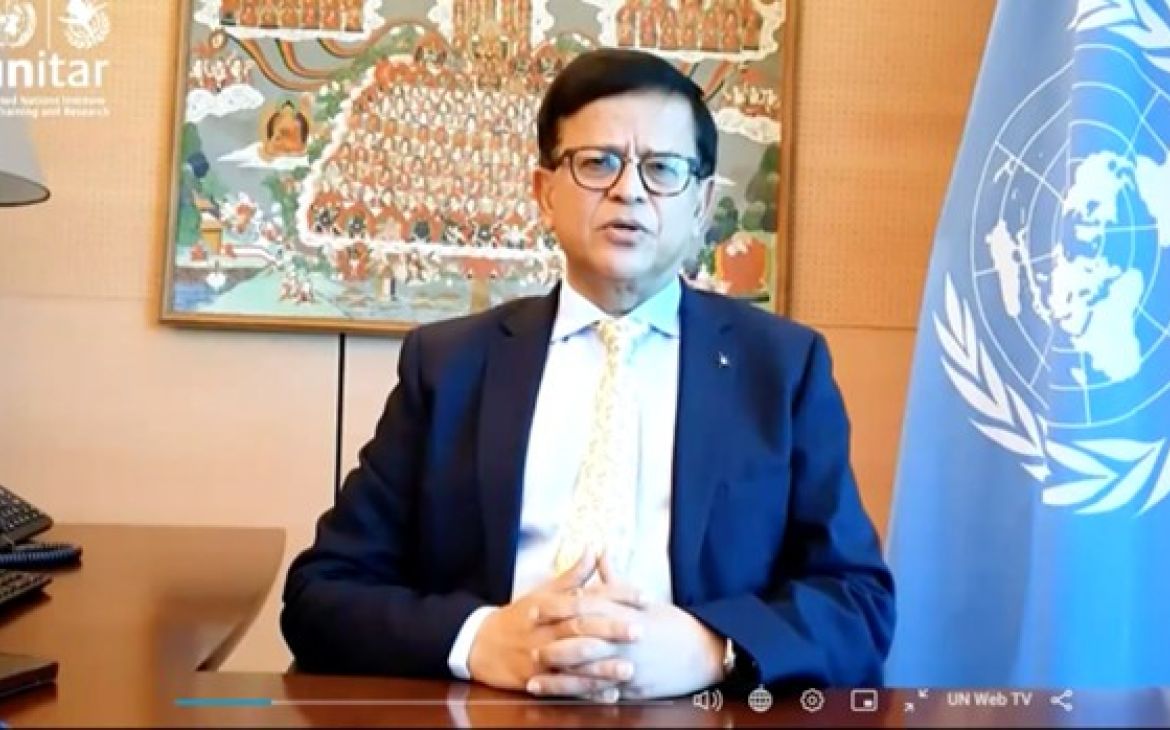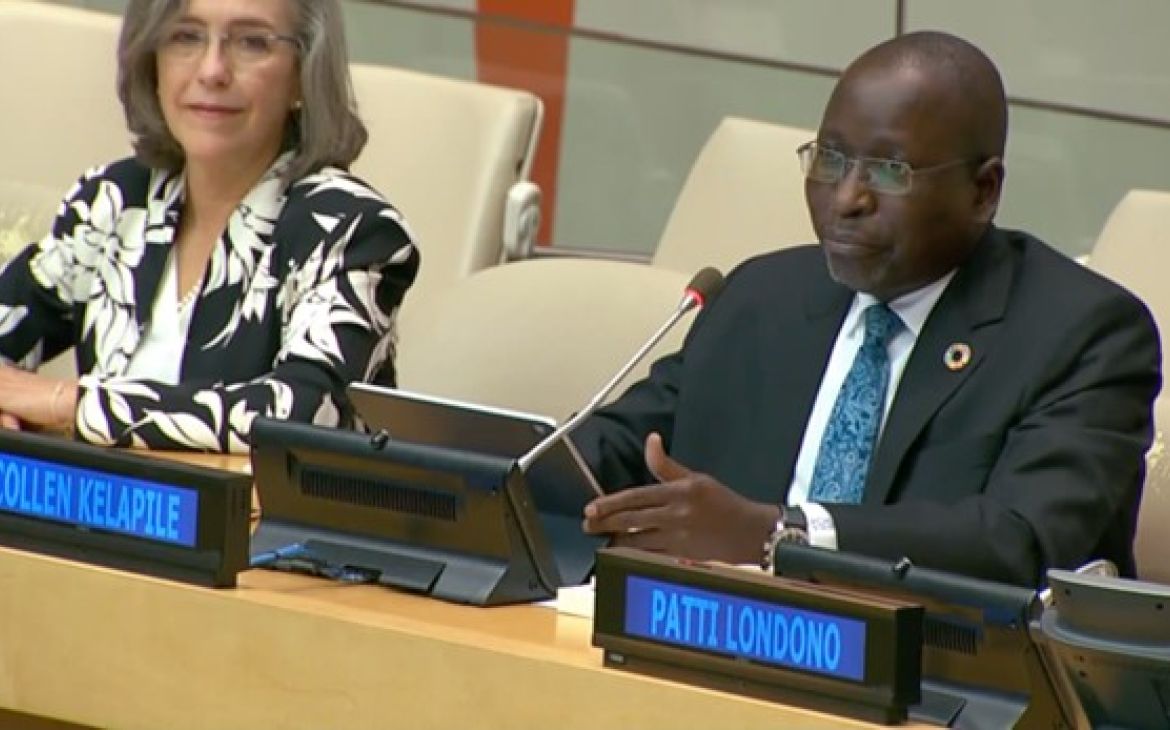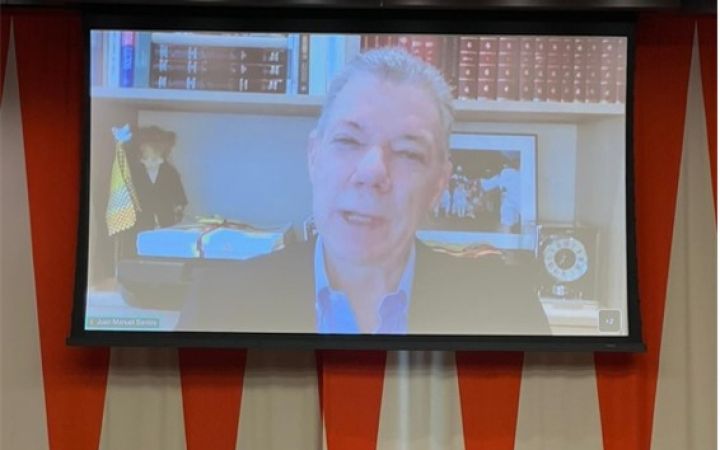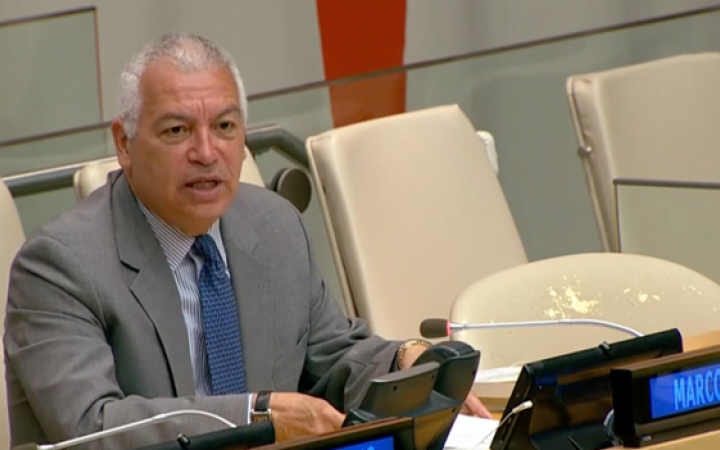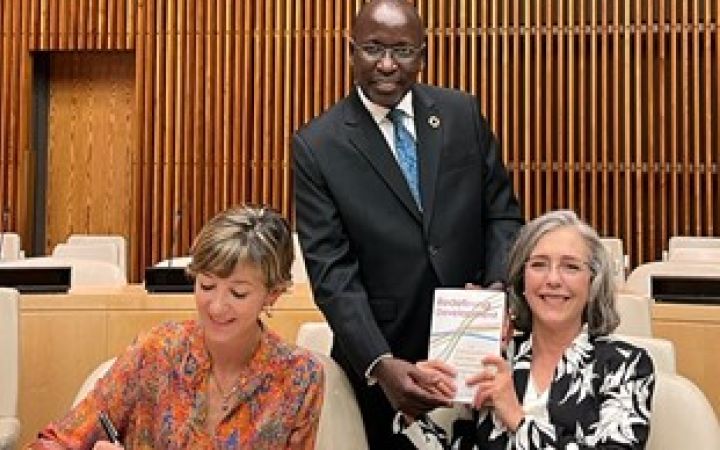14 June 2022, New York, USA - The United Nations Institute for Training and Research (UNITAR) office in New York organized a launching event in the United Nations (UN) Economic and Social Council (ECOSOC) Chamber for the new book, "Redefining Development: The Extraordinary Genesis of the Sustainable Development Goals". The launching attracted more than 70 in-person participants and numerous interested individuals from different parts of the world who managed to follow the event simultaneously through the UN Web TV livestream.
Former President of Colombia and the sole recipient of the 2016 Nobel Peace Prize, His Excellency Mr. Juan Manuel Santos connected to the event virtually, along with five other speakers who joined the audience at the venue. These speakers have each contributed immensely to the creation and the negotiation of the UN Sustainable Development Goals (SDGs). The presenters of the day included two co-authors of the book, Ms. Paula Caballero and Ms. Patti Londoño; the Permanent Representative of Botswana and ECOSOC President, His Excellency Mr. Collen Kelapile; the Director of SDG Fund, Dr. Paloma Duran; and the Head of the UNITAR New York office, Mr. Marco Suazo.
In the beginning of the event, after introducing the respective speakers, Mr. Suazo emphasized the importance of promoting gender balance and equality by recognizing and highlighting the work of female SDG practitioners, both within and beyond the UN Secretariat. As the dedicated training arm of the UN, UNITAR has been at the forefront of promoting SDGs. UNITAR is also an adamant proponent in enhancing the depth and the scope of capacity training. The backdrop of pandemic, and the gap between expectations and realities of the 2030 Agenda made this publication highly relevant and necessary.
The Executive Director of UNITAR, Mr. Nikhil Seth, recorded a welcome message to the audience. He commended that the book not only serves as a summary and remembrance of the outcome document for the epic and lengthy SDGs negotiations, it also constantly reminds the public that the conception of SDGs and the fights for a sustainable future are uphill battles. Following the sentiment of Mr. Seth’s message, President Kelapile expressed his respect for the two authors who participated, led, and executed in the design of SDGs. President Kelapile believed that the cordial relationship between the members of the SDG Open Working Group (OWG) [1]is one of the most contributing factors to the successful transition from Millennium Development Goals (MDGs) to SDGs. Part of the ECOSOC’s mission is to accelerate the progress of SDGs. With the assistance and the support from the Member States and other stakeholders, a global solidarity around sustainability will further motivate the implementation of the 2030 Agenda.
[1] The Open Working Group was established on 22nd of January 2013 by decision 67/555 (see A/67/L.48/rev.1) of the General Assembly. The Member States have decided to use an innovative, constituency-based system of representation that is new to limited membership bodies of the General Assembly. This means that most of the seats in the OWG are shared by several countries.
As the home country to the two writers, Colombia has been a leader in the Latin America region and the world regarding the negotiation and formulation of the 2030 Agenda and the SDGs. Colombia is one of the first countries who incorporated SDGs to its new National Development Plan. Colombia’s immense natural resource reserve and high concentration on biodiversity inevitably led to discussions on environment preservation. Former Colombian President and Nobel Peace Prize recipient Mr. Santos reflected on one of his memorable visits to the indigenous community in a remote Colombian village, and he firmly believed that the adaptation and the advancement of SDGs have significantly benefited the local communities. According to Mr. Santos, Colombia is the first country that regionalized the SDGs, and one of the first countries that adopted the Multidimensional Poverty Index (MPI)[1].
Colombia’s decision on using scientific measurement for its SDGs progression results in accurate reflections of local realities, which provides scientists and experts abundant evidence and access to help develop the region both economically and sustainably. Prior to the adoption of SDGs, there was the creation of SDGs.
[1] The global Multidimensional Poverty Index (MPI) is an international measure of acute multidimensional poverty covering over 100 developing countries. It complements traditional monetary poverty measures by capturing the acute deprivations in health, education, and living standards that a person faces simultaneously.
The moderator, the Director of SDG Fund, Ms. Paloma Durán shifted the conversations slowly to the writing of the book, the Managing Director for The Nature Conservancy, the former Senior Director at the World Bank Global Practice for Environmental & Natural Resources, and the “mother of SDGs”, Ms. Paula Caballero who provided the audience with a glimpse of the behind-the-scenes of the SDGs negotiation. Both Ms. Caballero and the Former Deputy Minister for Multilateral Affairs, Dr. Patti Londoño firmly believed that the conception of SDGs was not inevitable - in fact, its creation symbolized the success of numerous negotiations, and the acknowledgement of the needs for advancement and development. Instead of sticking to the status quo, the UN is always striving for the better - a better reality, and the guarantee for a better future. In that sense, the book is both an invitation to people who want to understand more about the 2030 Agenda, and an inspiration for people who are implementing the goals on the ground.
The creation of SDGs disrupted the existing reality, and offered another possibility for a better future that mankind deserves. “Rome wasn’t built in one day” - the publication documented the arduous and germane process of its creation, but it also emphasized how crucial it is to listen to the fears of both developing and developed countries. The respect and the patience that the OWG has offered to the Member States led to the unanimous approval of SDGs by all the Member States. Today, the SDG continuously serves as the guiding principles for the new century and beyond.
After the conclusion of the conversations, the co-authors stayed for the book signing, and had brief interactions with attendants of the event.


